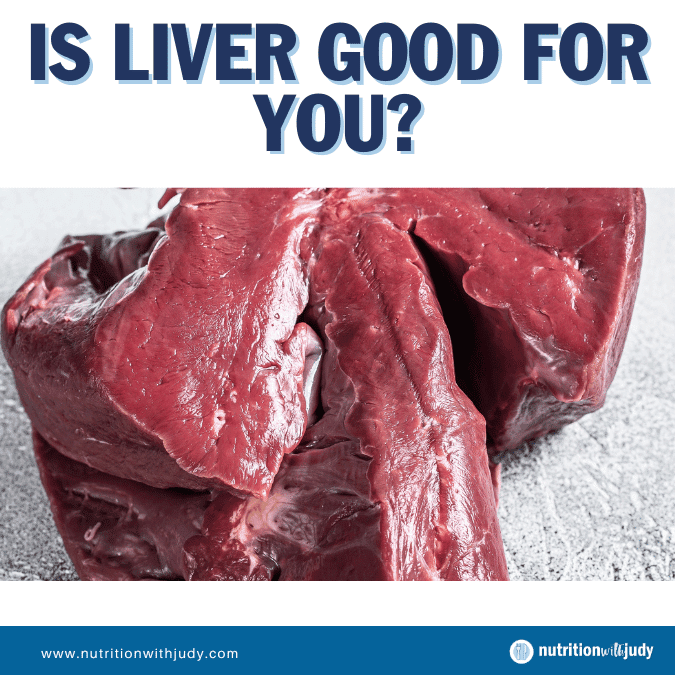

Is Liver Good for You?


Liver, often hailed as nature’s multi-vitamin, is indeed a nutritional powerhouse and many wellness influencers champion it as a miraculous addition to the diet. It’s an especially popular recommendation for those on a carnivore diet, known for its focus on animal products. However, the truth about consuming liver, particularly in the context of a carnivore diet, is surrounded by significant nuances.
While liver is rich in essential nutrients such as vitamin A, copper, vitamin B12, and iron, it’s crucial to understand that these can be present in excess. Our liver stores these nutrients, especially the fat-soluble vitamins. Consuming too much animal liver can potentially lead to an overload of these nutrients, impacting our body’s ability to produce ketones and bile, vital for a healthy metabolism.
This is where the importance of balance becomes evident. A diet that focuses too heavily on superfoods such as liver, despite their high nutrient density, can be counterproductive. It’s essential, especially for those on a carnivore diet, to consider a variety of meats to ensure a well-rounded nutrient intake. This approach not only prevents the risk of hypervitaminosis but also supports holistic healing and optimal health.
While liver may be a beneficial part of your diet, let’s take a closer look at these nuances so you can decide if liver is good for you and your specific diet.
What Is the Carnivore Diet?
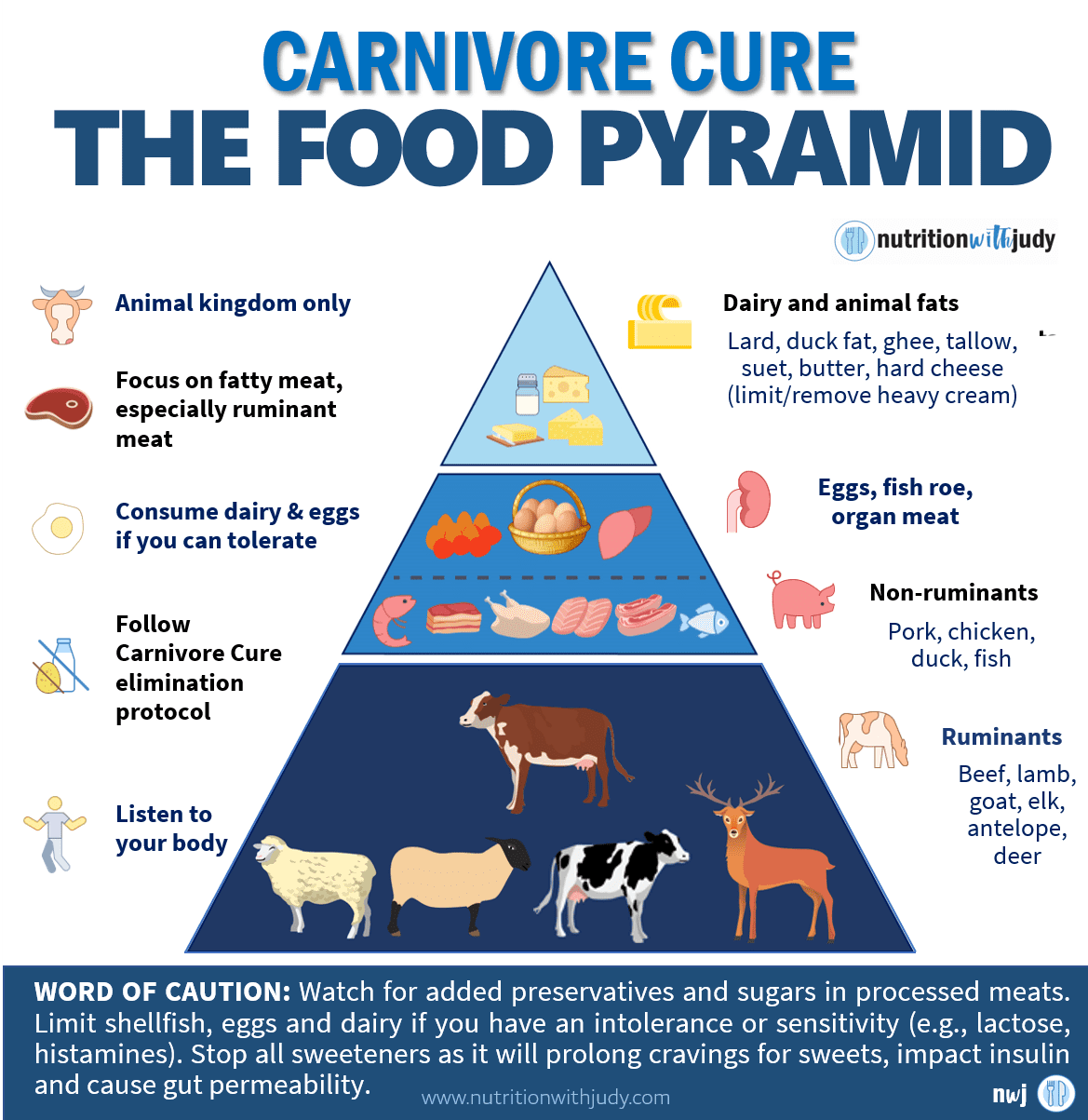

The carnivore diet, centered around animal products, offers multiple variations to suit different health objectives and individual preferences. Here’s a breakdown of each variation:
- Beef-Only Carnivore Diet: This version focuses exclusively on beef consumption, ideal for simplicity and effectiveness, particularly in elimination diets. It’s recommended for individuals dealing with autoimmune or chronic health conditions, aiming for support or remission. For long-term success and nutritional variety, gradually introducing a range of meats is advisable.
- Lion Diet: One of the more restrictive carnivore diets, the lion diet limits intake to ruminant meats, salt, and water. Often a starting point in elimination diets, it allows for the slow reintroduction of other meats, making it suitable for those focusing on autoimmune and gut health.
- Nose-to-Tail Carnivore Diet: Advocating for consuming every part of the animal, including organ meats, this variation ensures a broad spectrum of nutrients. However, be mindful of liver and kidney intake to avoid issues such as vitamin A toxicity, particularly if you have liver-related health concerns.
- Muscle Meat-Only Carnivore Diet: This diet includes all types of animal muscle meats while excluding organ meats, dairy, and eggs. It’s an excellent foundational elimination diet for those who know they tolerate muscle meats well.
- Zero-Carb Carnivore Diet: Targeting almost zero carbohydrate intake, this diet encompasses dairy, eggs, and all meats, focusing mainly on meat and animal fats. Seasonings may be included. It’s an ideal choice if you don’t have autoimmune or serious chronic health issues and tolerate dairy and/or eggs.
- Carnivore Keto Diet: Merging ketogenic diet principles with the carnivore approach, this low-carb, high-fat diet is designed for those who are metabolically healthy and have resolved or nearly resolved their chronic health conditions. It includes low-toxicity keto-friendly foods such as avocados and coconut oil.
- Carnivore-ish Keto Diet: Offering more versatility, this diet integrates additional ketogenic elements while still emphasizing animal-based foods. It’s suitable for metabolically healthy individuals who have overcome food addiction issues, including alternative keto sweeteners, some nuts, and other keto varieties.
- Animal-Based Diet: More accommodating than the strict carnivore diet, it revolves around animal products but also includes fruits, honey, and raw dairy. This diet has only been successful mainly for those with high metabolic flexibility and elite athletes in our clinical practice.
Each of these carnivore diet variations is designed to cater to different dietary needs and goals, ensuring a tailored approach to wellness and health optimization.
What Are the Benefits of the Carnivore Diet?
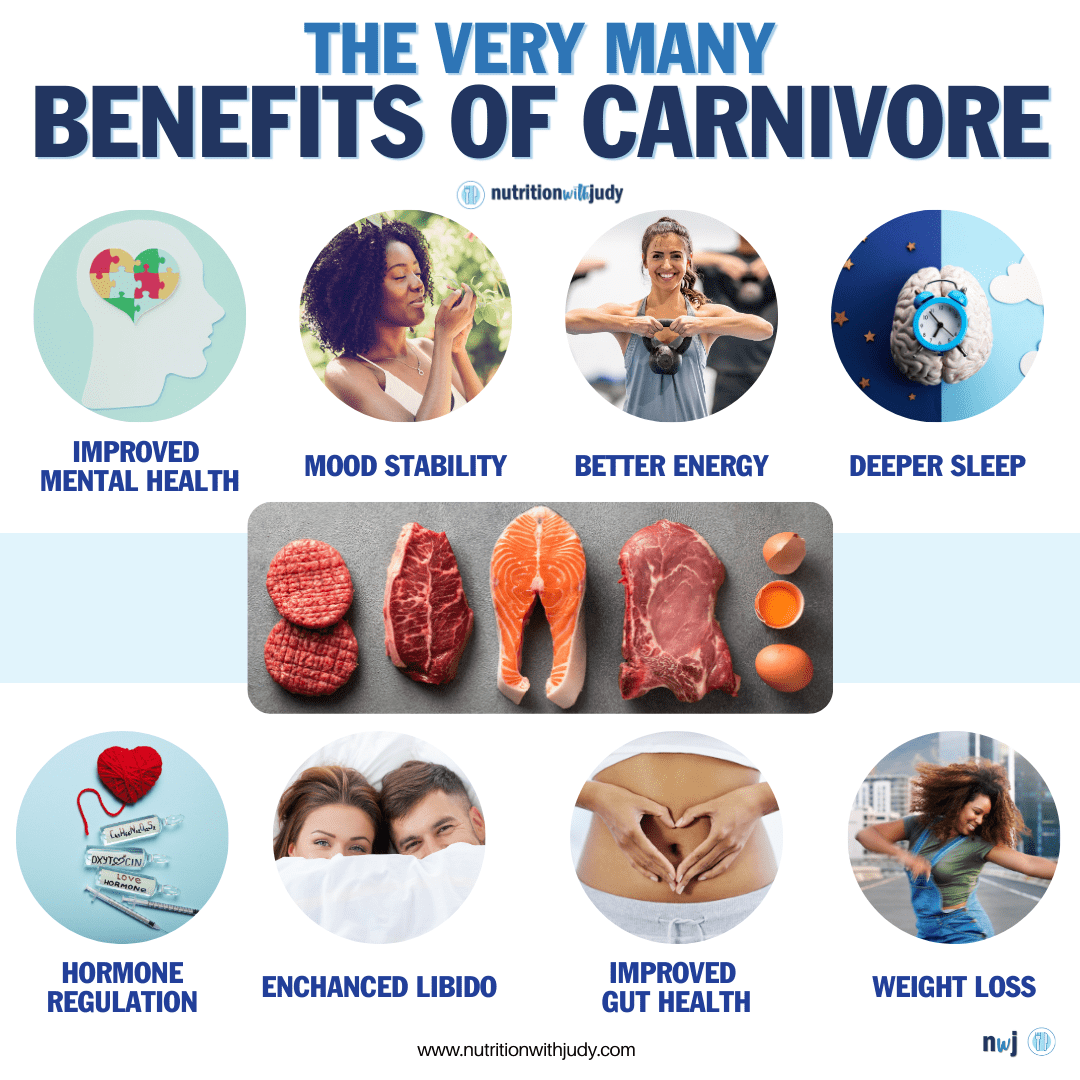

The carnivore diet, with its focus on animal-based foods, offers a range of health benefits that can cater to various needs, from mental health improvements to addressing autoimmune disorders and hormonal imbalances.
One of the primary benefits of the carnivore diet is its potential to alleviate mental health issues, including depression and anxiety. Numerous individuals have reported significant mental health improvements after adopting this diet. For instance, after struggling with depression for years, some have found relief and a newfound freedom from the love-hate relationship with food that often accompanies mental health struggles.
Moreover, the carnivore diet acts as an effective elimination diet, which is particularly beneficial for those suffering from metabolic diseases, autoimmune disorders, thyroid issues, and hormone imbalances. By removing potential dietary triggers, such as fruits and vegetables that are not eliminated in other diets, it supports healing and health improvement.
The diet’s approach to food sensitivities and intolerances is another key advantage. Traditional food sensitivity tests can be unreliable, but the carnivore diet simplifies the process by eliminating common allergens and irritants, making it easier to identify and manage food-related issues.
Nutritionally, the carnivore diet emphasizes the importance of consuming a variety of meats to avoid nutrient excesses and imbalances, which can be just as harmful as undernutrition. This approach ensures a more balanced intake of essential nutrients, aiding in overall health and well-being.
For those with specific health concerns such as insulin resistance, gut issues, or mineral imbalances, the carnivore diet offers a tailored approach. It can be adjusted to meet individual needs, making it a versatile option for diverse health goals.
Additionally, the diet’s historical and anthropological roots suggest that humans are naturally inclined towards a carnivorous diet. This perspective is supported by research into our ancestors’ dietary habits, where fatty meat was a prized and sought-after part of their diet.
Beyond individual health benefits, the carnivore diet also encourages sustainable food practices. By supporting local farmers and choosing less processed, monocropped foods, followers of the diet contribute to a more environmentally friendly food system.
While the carnivore diet can be highly beneficial, it’s important to remember that it may not be suitable for everyone. Each individual’s response to the diet can vary, and it’s crucial to listen to one’s body and make adjustments as needed. Some may find that reintroducing certain foods over time can help achieve a more balanced and sustainable diet.
The carnivore diet offers a range of health benefits, from mental health improvements to weight loss and the potential to address specific health issues. Its flexibility and adaptability make it a valuable option for many seeking to improve their health through dietary changes.
What Are the Benefits of Eating Liver?
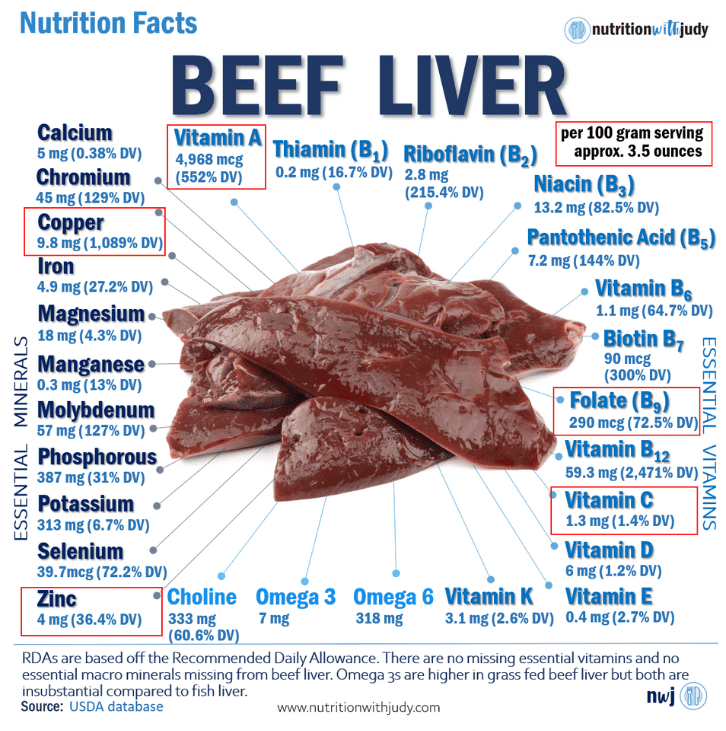

Liver, often regarded as one of the most nutrient-dense foods, is packed with essential vitamins and minerals that offer numerous health benefits. However, it’s important to consume liver in moderation to avoid potential nutrient imbalances.
One of the key nutrients found in liver is vitamin A, crucial for maintaining healthy vision, immune function, and skin health. Liver is an excellent source of this vitamin, but it’s important to be mindful of vitamin A toxicity. Excessive intake can lead to health issues, so moderation is key. We always recommend eating organs within proportion to the animal.
Liver is also rich in vitamin B12, essential for red blood cell formation, neurological function, and DNA synthesis. Just three and a half ounces of liver provides an astonishing 2471% of the daily value for vitamin B12. However, many other carnivore diet foods such as ruminants and red meat also contain abundant levels of vitamin B12.
Additionally, liver contains significant amounts of copper, an essential trace mineral important for heart health, brain development, and immune function. However, the copper content in liver is quite high, with three and a half ounces providing about 1100% of the daily value. Balancing copper intake with other minerals such as zinc is important to maintain optimal health.
Iron, another vital nutrient found abundantly in liver, plays a crucial role in transporting oxygen throughout the body and is key for energy production. Liver’s high iron content makes it a beneficial food for those at risk of anemia or looking to boost their energy levels. It is important to note that red meat also contains high levels of bioavailable heme iron, so liver isn’t the only option for addressing anemnia and other nutrient deficiencies.
Liver offers a powerhouse of essential nutrients that can significantly contribute to overall health. Its high levels of vitamin A, B12, copper, and iron make it a valuable addition to a balanced diet. However, due to its nutrient density, it’s crucial to consume liver in moderation and balance its intake with other foods to avoid potential health risks associated with nutrient excesses. Kidneys should also be eaten in moderation for this reason as well.
What Are the Risks of Eating Liver?
Overconsumption of liver can lead to a range of health risks, primarily due to its high vitamin and mineral content. While liver is nutrient-dense, its excessive intake can cause an imbalance in the body.
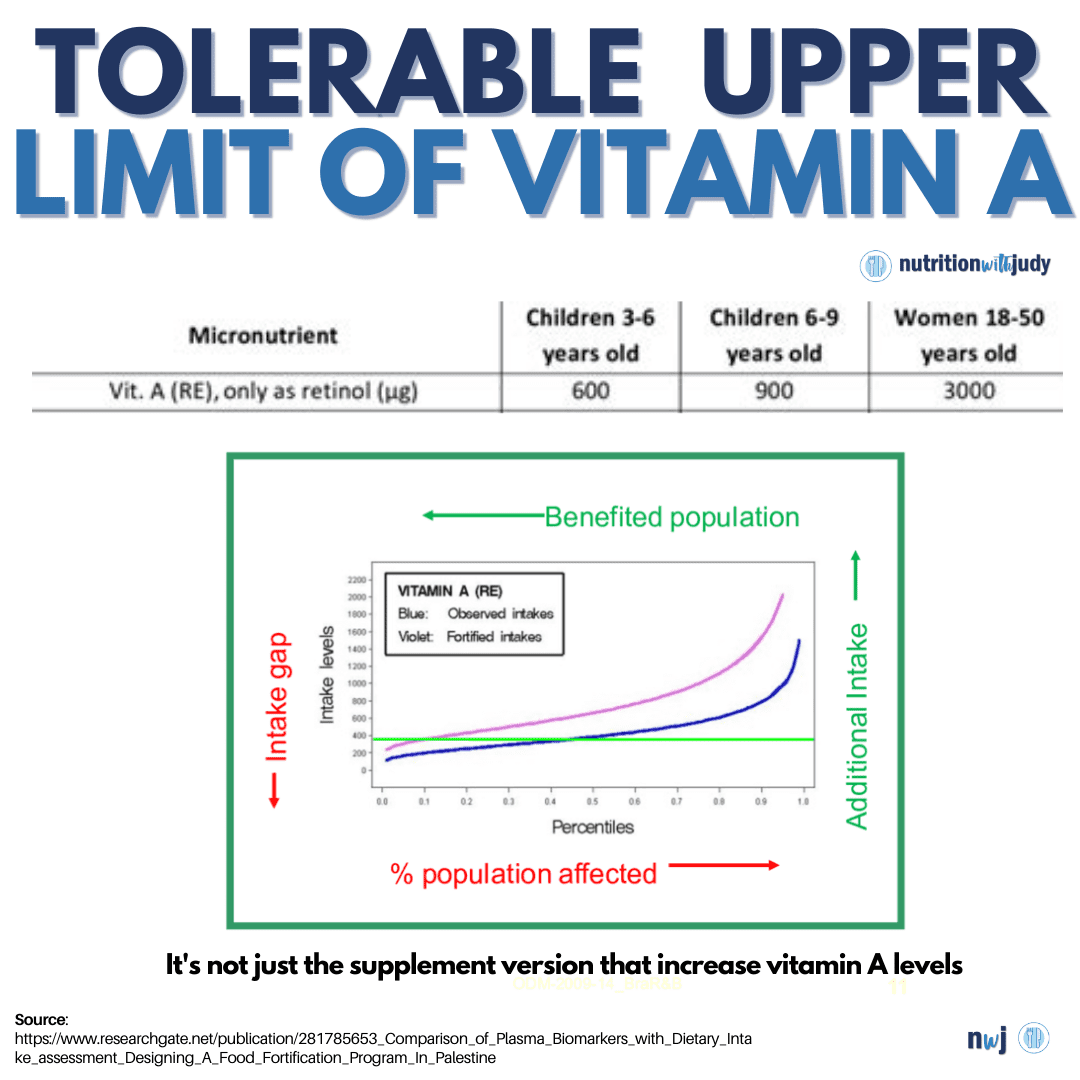

Vitamin A toxicity is a significant concern with liver overconsumption. Liver is rich in vitamin A, and excessive intake can lead to hypervitaminosis A, a condition where vitamin A accumulates to toxic levels in the body. This can cause various symptoms, including liver damage, bone pain, and vision problems. It’s important to note that the tolerable upper limit for pre-formed animal-based vitamin A is relatively low, and even small amounts of liver can exceed this limit, especially in children.
Another risk associated with liver consumption is copper toxicity. Liver contains high amounts of copper, which is essential in small quantities but harmful in excess. Copper balances with zinc in the body, and an imbalance can disrupt this equilibrium. Just three and a half ounces of liver provides about 1100% of the daily value of copper, which can lead to imbalances and potential health issues if consumed regularly in large amounts.
Furthermore, consuming too much liver can inundate the human liver with excess nutrients, potentially affecting its function. This can impact the body’s ability to produce ketones and bile, essential for digestion and metabolism. Additionally, overconsumption of liver may interfere with the thyroid function, affecting the conversion of T4 to T3 hormones in the liver.
Individuals with pre-existing liver conditions, such as non-alcoholic fatty liver disease or those who have used vitamin A-based medications such as retinol or Accutane, should be particularly cautious with liver intake. In these cases, limiting or avoiding liver consumption might be advisable.
Overall, while liver is a nutrient-rich food, its overconsumption can lead to serious health risks. It’s advisable to consume liver in proportion to the animal (and only if you enjoy it) and consider a varied diet to avoid the potential dangers of nutrient excess and imbalance. Eating a variety of meats and other foods can help maintain nutritional balance and support overall health.
Should I Eat Liver In My Carnivore Diet?
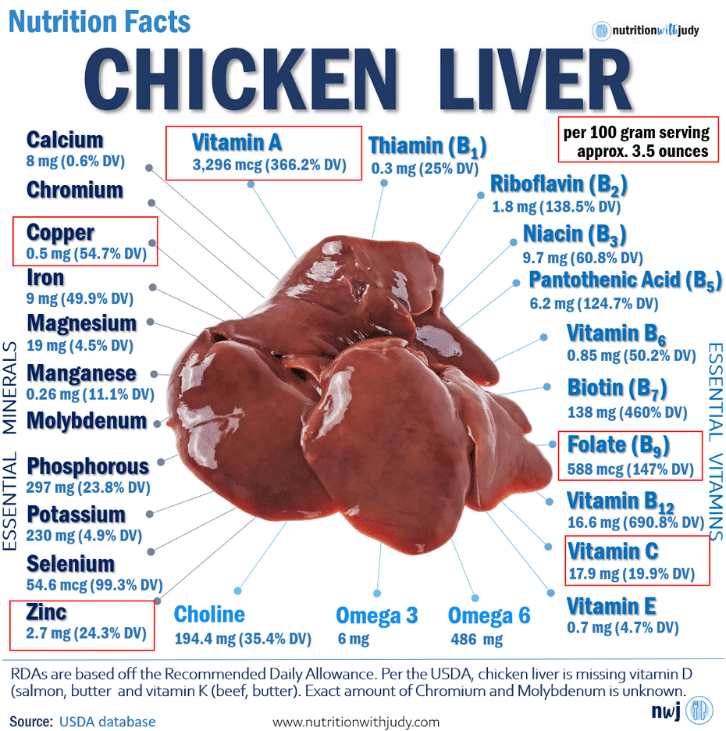

Deciding whether to include liver in a carnivore diet involves a nuanced and individualized approach. While liver is nutrient-dense, offering benefits such as high vitamin A, B12, copper, and iron content, its overconsumption can lead to health risks such as vitamin A toxicity and copper imbalance.
Individual health history plays a critical role in determining if liver should be a part of one’s diet. Those with conditions such as non-alcoholic fatty liver disease, previous liver imbalances, or a history of using vitamin A-rich medications might need to limit or avoid liver to prevent exacerbating these issues. Conversely, individuals with a history of nutrient deficiencies, such as those recovering from anorexia, might find liver beneficial due to its rich nutrient profile. It’s best to work with your trusted carnivore diet practitioner to see how much liver you can safely eat.
It’s essential to listen to one’s body and observe how it reacts to different foods. What works for one person may not work for another. For instance, some may thrive on a carnivore diet with liver, while others may experience adverse effects or find no additional benefit. A moderate consumption approach, such as limiting liver intake to no more than two ounces a week, can be a balanced way to incorporate its nutrients without overloading the body. Remember, there are many individuals who heal and thrive on the carnivore diet without ingesting any organ meats.
Moreover, the overall context of the diet matters. A diet that includes a variety of meats might provide a more balanced nutrient profile than one focusing exclusively on liver or any single food. It’s important to consider the balance of nutrients and how they interact within the body, especially in a meat-only or carnivore diet.
Ultimately, personal experimentation and adjustment are key. Each individual’s dietary journey is unique, and adopting a flexible approach that considers personal health history, current health status, and dietary responses is crucial for optimizing health on a carnivore diet.
Comparing the Nutritional Value of Beef Liver vs. Chicken Liver
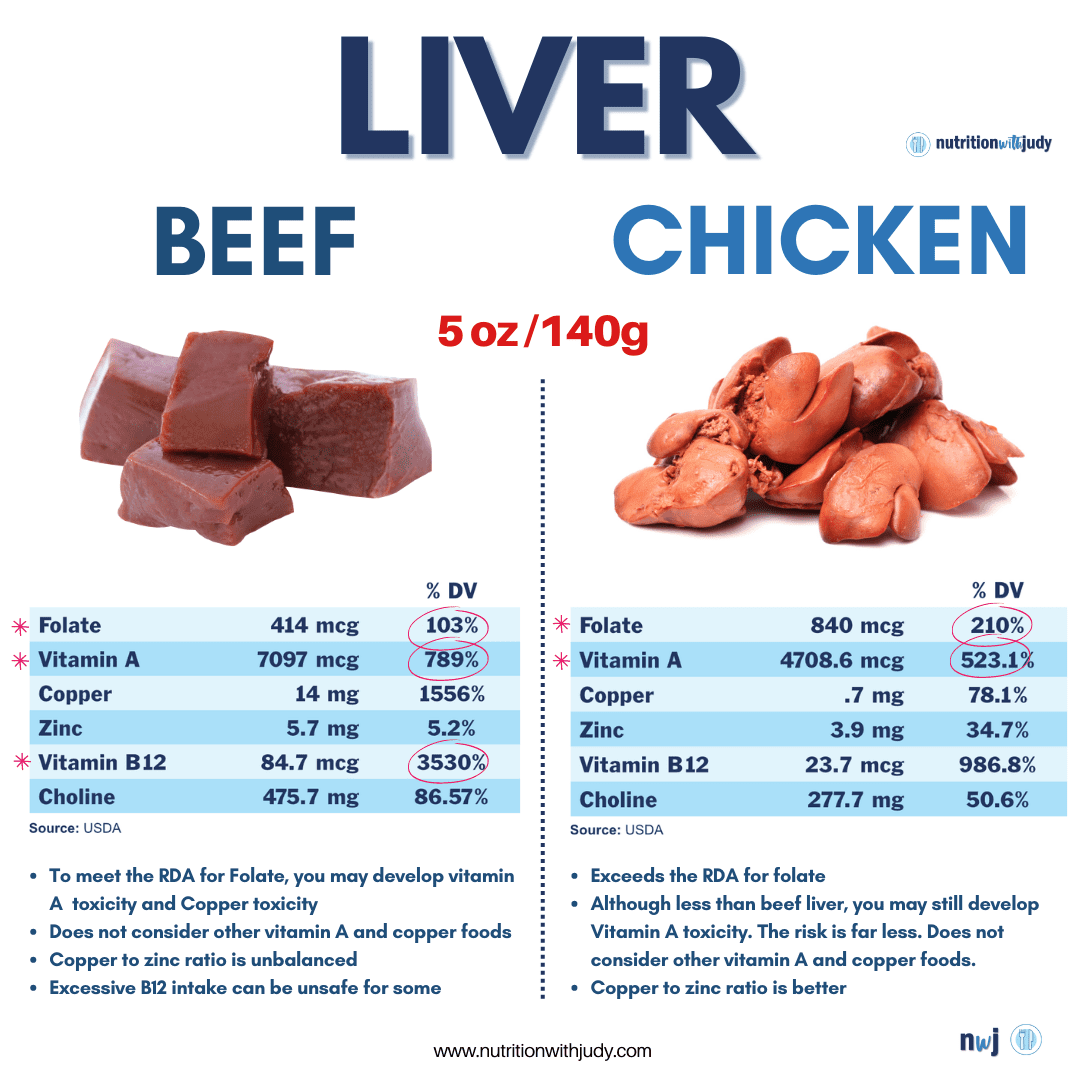

Beef liver and chicken liver, while both nutrient-dense, have distinct nutritional profiles that should be considered when incorporating them into a diet.
Beef liver is exceptionally high in certain nutrients. One ounce of beef liver contains about 1419 micrograms of vitamin A, which is well above the tolerable upper limit for young children. This high concentration indicates that even small amounts of beef liver can significantly exceed the recommended daily intake of vitamin A, posing a risk of vitamin A toxicity if consumed in large quantities over time. In addition to its vitamin A content, beef liver is also very high in copper. Just three and a half ounces can provide about 1100% of the daily value for copper. However, beef liver has a lower amount of zinc, with three and a half ounces containing only 36% of the daily value, highlighting an imbalance between copper and zinc.
On the other hand, chicken liver, while also rich in vitamins and minerals, typically has a different nutritional balance compared to beef liver. The exact nutritional content can vary, but generally, chicken liver is a good source of various vitamins and minerals, including vitamins A, B12, and iron, but it may have different concentrations of these nutrients compared to beef liver.
We often recommend chicken liver over beef liver due to the smaller amount of vitamin A and higher amounts of folate. In terms of organ meats, we always recommend sourcing higher-quality organs when possible, especially with liver. Try opting for grass-finished options when available.
Should I Include Other Organs In My Carnivore Diet?
Deciding whether to include organ meats such as liver and kidney in a carnivore diet is a highly individualized decision. While these organs are nutrient-rich, they also carry the risk of vitamin A toxicity if consumed excessively. Liver, for instance, is particularly high in vitamin A, and overconsumption can lead to health issues related to vitamin A overload. It’s important to be mindful of this, especially when considering the inclusion of organ meats in the diet.
Other organ meats, while still nutritious, may pose fewer risks when eaten in moderation compared to liver and kidney. These organs can provide a range of essential nutrients without the high levels of vitamin A found in liver and kidney. However, organs should only be eaten if you enjoy them. We don’t believe in forcing unnecessary organ meats or desiccated organ supplements.
It’s also worth noting that many individuals thrive on a carnivore diet without including organ meats. Personal preference and individual health goals should guide the decision. For those who choose to include organ meats such as liver, a cautious approach is advisable. Consuming no more than two ounces of liver per week, for example, can help mitigate the risk of vitamin A toxicity while still providing nutritional benefits.
Whether to include organ meats in a carnivore diet depends on personal health considerations and dietary goals. While liver and kidney are nutritious, their high vitamin A content requires careful consumption. Other organ meats can be safer options when eaten in moderation. Ultimately, each individual should assess their own dietary needs and preferences to make the best choice for their health.
Closing Thoughts On Liver, Organs, and the Carnivore Diet
Incorporating liver and other organ meats into a carnivore diet involves careful consideration due to their high nutrient density and potential risks. Liver, renowned for being nutrient-rich, is particularly high in vitamin A, B12, copper, and iron. However, its overconsumption can lead to vitamin A toxicity and copper overload. This necessitates moderation in its consumption, with a recommendation to limit liver intake to no more than two ounces per week to mitigate these risks. The choice between beef and chicken liver should also be informed by individual dietary needs, as they have distinct nutritional profiles.
While liver and kidney are valuable for their nutrient content, they pose a higher risk of vitamin A toxicity compared to other organ meats. Therefore, including a variety of organ meats, in moderation, can provide essential nutrients with lower health risks. It’s important to note that many thrive on a carnivore diet without consuming organ meats, indicating that their inclusion is a matter of personal preference and health goals.
Overall, the decision to include liver and other organs in a carnivore diet should be individualized, considering personal health history, dietary goals, and the body’s response to these foods. A balanced approach, incorporating a variety of meats and organ meats, can help maintain nutritional balance and support overall health.
Work With Our Trusted Carnivore Diet Functional Nutritional Therapy Practitioners
The Nutrition with Judy practice is honored to be a trusted carnivore diet practitioner support serving clients from around the globe. We’re passionate about helping our clients achieve root-cause healing in order to lead the best quality of life possible that’s nearly symptom-free. Our team is dedicated to educating our community about the incredible benefits of the carnivore diet. We welcome you to explore our free resources and are always available to support you through personalized protocols. Our Symptom Burden Assessment (SBA) is the perfect starting point for discovering your root cause and is required to work with our team— you can learn more in-depth about this powerful tool here.
Start your root-cause healing journey today and contact us any time with any questions or concerns.
DISCLAIMER: This content is for educational purposes only. While we are board-certified in holistic nutrition and are nutritional therapy practitioners, we are not providing medical advice. Whenever you start a new diet or protocol, always consult with your trusted practitioner first.





